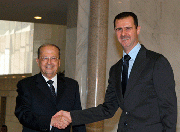Free Patriotic Movement (FPM) leader Michel Aoun on Wednesday predicted a “bright future” for ties between Lebanon and his former foe Syria after talks in Damascus with Syrian President Bashar Assad.

|
| Syria’s President Bashar al-Assad (R) shakes hands with Lebanese Christian opposition leader Michel Aoun before a meeting in Damascus December 3, 2008. REUTERS/Khaled al-Hariri |
“We are turning a new page where there is no victor and no loser. This is a return to normal relations,” Aoun told a news conference on the first day of a visit to the Syrian capital.
“Our discussions hold the promise of a bright future” for the two countries, he said of his meeting with Assad, voicing confidence that any problems between Damascus and Beirut would be resolved.
In one of the closing rounds of the 1975-1990 Civil War in Lebanon, Aoun, as the head of a disputed Christian government, waged a fierce “war of liberation” against Syrian forces deployed in the country.
Forced out of the Presidential Palace in October 1990, he went into exile in France and only returned to Lebanon in May 2005, a month after the end of Syria’s 29-year military presence.
“This is an old story that is now over. We must have better relations with Syria,” the FPM leader stressed.
He added: “I am a military man and I do not have hatred for any party with whom I fight. The reason is that wars always end in negotiations and agreements.”
“Today, we are opening a new page in history,” he said.
On the Syrian side, Assad political adviser Buthaina Shaaban said that Aoun’s visit represents “a new era between Syria and Lebanon that will serve the interests of the two countries and the two peoples.”
Aoun also told reporters he hoped for a rapid solution to the issue of Lebanese “missing” in Syria, whom support groups in Beirut number at 650 but whom Damascus denies holding.
Asked about priorities in restoring Lebanese-Syrian relations, Aoun said: “We have exchanged viewpoints and showed good will, but there were no demands by any of the two parties and we did not set a schedule for priorities.”
On the political front, he said Syria was “supportive of the holding of legislative elections [due to be held in Lebanon in the spring] but without interfering” in the process.
“Syria does not interfere in the elections. It does not send electoral money,” he said, hinting at claims that Saudi Arabia was financing the March 14 Forces’ electoral campaign.
Shrugging off criticism of his visit from March 14, the anti-Syrian camp which holds the parliamentary majority in Lebanon, Aoun said his mission was justified now that diplomatic ties have been established between Damascus and Beirut.
During his meeting with Assad, Aoun discussed the “positive developments in the Lebanese-Syrian relations” and the situation in Lebanon and the region, he said.
A report by Lebanon’s National News Agency said that both leaders agreed to establish future relations that “serve both countries’ interests and that are based on mutual respect of their sovereignty and independence.”
Aoun’s critics accuse the former Lebanese Armed Forces chief of being a turncoat and of kowtowing to his former adversaries for political gain.
Aoun, 73, stunned Lebanon in 2006 when he entered an alliance with the Iranian and Syrian-backed Hizbullah.
He also caused a stir by visiting Iran in October.
The retired general is due to visit Christian holy sites during his visit to Syria, which will last several days.
Syria and Lebanon launched diplomatic ties for the first time in October after years of tense relations following the murder in February 2005 of former premier Rafik Hariri. Damascus was widely blamed for the killing but denies involvement.
Lebanese Forces (LF) leader Samir Geagea reiterated on Wednesday that he disapproved of Aoun’s visit to Syria.
Commenting on Aoun’s statement that Syria would not interfere in the elections, Geagea said: “It is true that Syria does not send money. In fact, it sends weapons and militants and Iran takes care of the money.”
In remarks delivered from his residence in Maarab, the LF boss added: “We all know that the Syrians receive regular visits from Lebanese politicians who are seeking Syria’s support in the upcoming parliamentary elections.”
Geagea, a member of the March 14 Forces, added that “the Lebanese did not ask Aoun to purify souls between Lebanon and Syria.”
“This is a task that only the Lebanese president is entitled to do,” he said.
In other remarks about Aoun’s visit, LF MP Antoine Zahra said on Wednesday that Aoun had rushed his trip to Syria, especially in view of the fact that several sensitive issues between the two countries remain unresolved.
In an interview with Voice of Lebanon radio station, he said: “I think that the visit was rushed after the painful history of the Lebanese-Syrian relations.”
“Opening a new page falls within the competence of constitutional authorities and not political parties,” he added.
Also on Wednesday, the head of the National Liberal Party, Dory Chamoun, said that Aoun had visited Syria to seek its support in the upcoming parliamentary elections.
Youth and Sports Minister Talal Arslan praised Aoun’s trip to Syria, describing it as a “historic visit.”
“Late Pope John Paul II would have been very happy to see Aoun visiting Syria and see how the Christians are engaging in a strategy of peace and openness,” he said.
—From The Daily Star






Leave a Reply